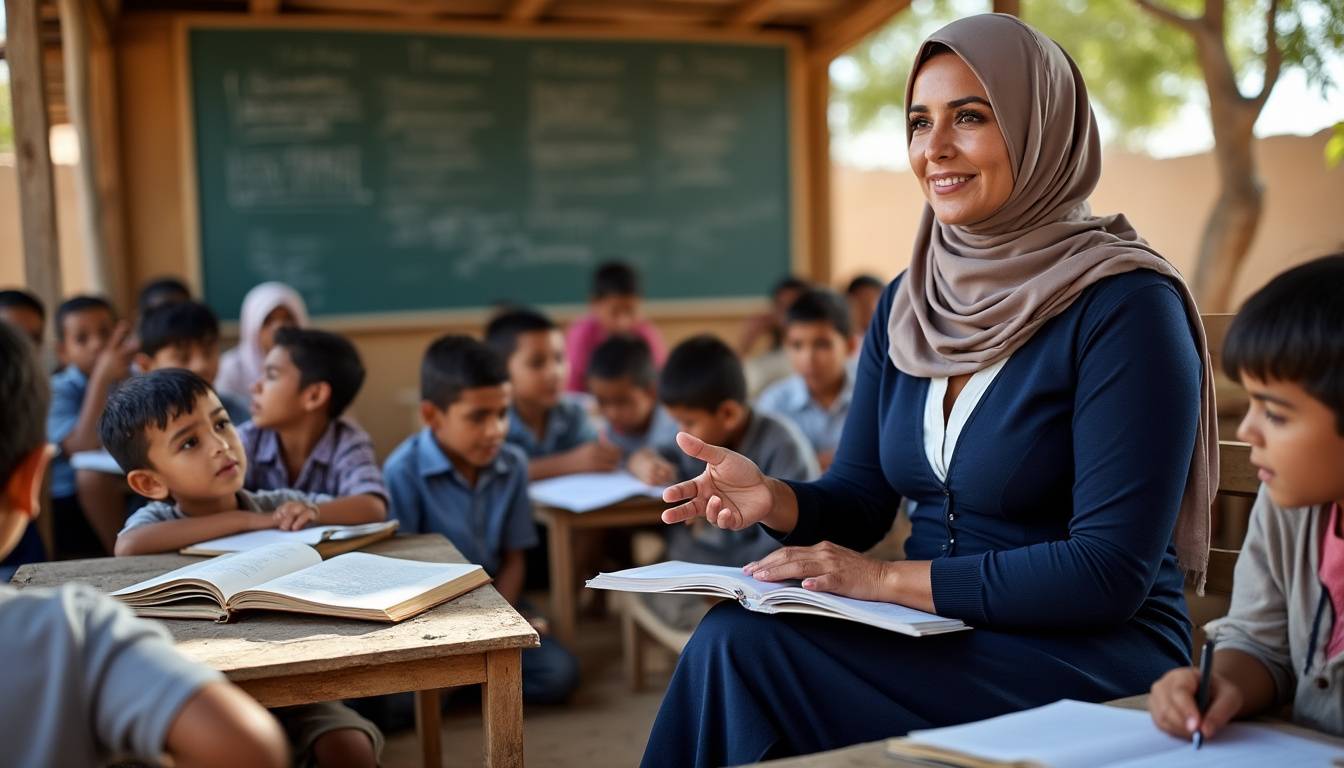In the midst of ongoing conflict and escalating humanitarian crises, First Lady Emine Erdoğan has emerged as a resolute advocate for the educational rights of Palestinian children. Her commitment to safeguarding the fundamental right to education in Gaza and other war-torn regions underscores a broader call for global solidarity and urgent action to protect vulnerable youth from the devastating impacts of war and displacement.
Emine Erdoğan’s Role in Protecting Palestinian Children’s Right to Education
During the extraordinary joint summit of the Organization of Islamic Cooperation (OIC) and the Arab League held in Doha on September 15, 2025, Emine Erdoğan took decisive action by signing a joint declaration focused on the protection of children’s education in conflict zones. This declaration, sponsored by influential figures including Sheikha Moza bint Nasser—the founder of the Education Above All Foundation—highlights a united global stance against the ongoing violations of children’s rights, particularly in Gaza.
The statement notably condemns what it refers to as Israel’s “educationcide” in Gaza, reflecting the deliberate destruction of educational facilities aimed at erasing the intellectual and cultural fabric of the Palestinian enclave. This alarming trend not only threatens individual futures but also undermines the collective potential for peace and social rebuilding.
- Signatories include first ladies and leaders from diverse countries such as Bosnia-Herzegovina, Colombia, Gambia, Sierra Leone, Jordan, Malaysia, and former officials from Scotland.
- The declaration sheds light on 2024 being the worst year on record for children’s access to education in global conflict zones.
- It calls for comprehensive international efforts to halt attacks on schools, libraries, and universities in Gaza and other afflicted regions.
Global Organizations Aligning to Protect Education
Erdoğan’s advocacy does not stand alone; it aligns with the missions of major humanitarian and educational organizations actively working in conflict environments. Institutions such as UNICEF, Save the Children, Human Rights Watch, and Amnesty International have fiercely campaigned to protect educational spaces and the rights of children worldwide.
Moreover, initiatives like Education Cannot Wait and the Global Partnership for Education emphasize the urgent need for maintaining schooling during crises. Defense for Children International and War Child are also pivotal, providing support, rehabilitation, and protection for children caught in the crossfire.
- Human Rights Watch has documented numerous violations affecting schools in Gaza and other conflict zones.
- World Vision contributes by delivering educational materials and psychosocial support to displaced children.
- Protect Education in Insecurity and Conflict (PEIC) serves as a consortium advocating for policy changes to safeguard education in emergencies.
These combined efforts highlight that safeguarding education amid conflict is essential not only to individual development but also to long-term peacebuilding and societal resilience.
The Broader Impact of Denying Education to Children in Conflict Zones
First Lady Erdoğan poignantly reminds us that denying education to children effectively robs communities of their future. The violent disruption of schooling not only affects cognitive and social growth but also exacerbates cycles of poverty, displacement, and political instability.
Her reflections tie into a broader educational crisis reported internationally, including in regions affected by war such as Sudan, Ukraine, Myanmar, and Colombia. The intentional targeting of schools as part of warfare strategies underscores the urgent need for protective measures globally.
- In Gaza alone, the destruction of schools has led to thousands of children missing critical education.
- Children deprived of their right to study face increased vulnerability to recruitment by armed groups and exploitation.
- International policies supporting educational access during emergencies are vital to reversing this trend.
Erdoğan’s call reflects the vision of a world where every child has access to education, including pens, notebooks, and classrooms—fundamentals that nurture healing and empowerment.
Continuing the Legacy: The Istanbul Call and Global Advocacy
Emine Erdoğan has a history of championing Palestinian rights through education. A notable example is the ‘Istanbul Call for Gaza’ formulated in 2009 during a first ladies’ meeting in Istanbul, where a collective voice was raised against oppression through peaceful means.
More recently, the 2023 ‘One Heart for Palestine’ summit in Istanbul rekindled this spirit of solidarity. Erdoğan’s partnership with Sheikha Moza and other global figures continues to amplify the plight of Palestinian children and the importance of sustained educational access.
- This movement underlines education as a form of resistance and hope amid crisis.
- It invites global citizens and policymakers to join efforts in creating peaceful solutions.
- It stresses education as foundational to securing human dignity and future opportunities.
Her social media message poignantly asserts that every child denied education represents a lost piece of humanity’s collective future, emphasizing the importance of wide-scale engagement and support.
Educational Advocacy in the Context of Broader Human Rights
Support for Palestinian children’s education rights is intrinsically linked with wider human rights protections. Organizations dedicated to defending educational access frequently advocate alongside groups emphasizing legal and humanitarian frameworks.
This intersectionality stresses the need for holistic policies, including those that protect immigrant and special needs students — topics covered comprehensively by resources such as support for special educational needs and immigrant access policies.
- Federal and international policies must safeguard continuity of education amid displacement.
- Addressing school refusal linked to trauma can improve attendance and learning outcomes (school refusal crisis journey).
- Enhanced support for students with special needs remains pivotal in conflict and post-conflict contexts.
These insights illustrate that education advocacy intertwines with broader educational freedom initiatives, including those discussed in educational freedom landscapes and debates on policy exemptions.


